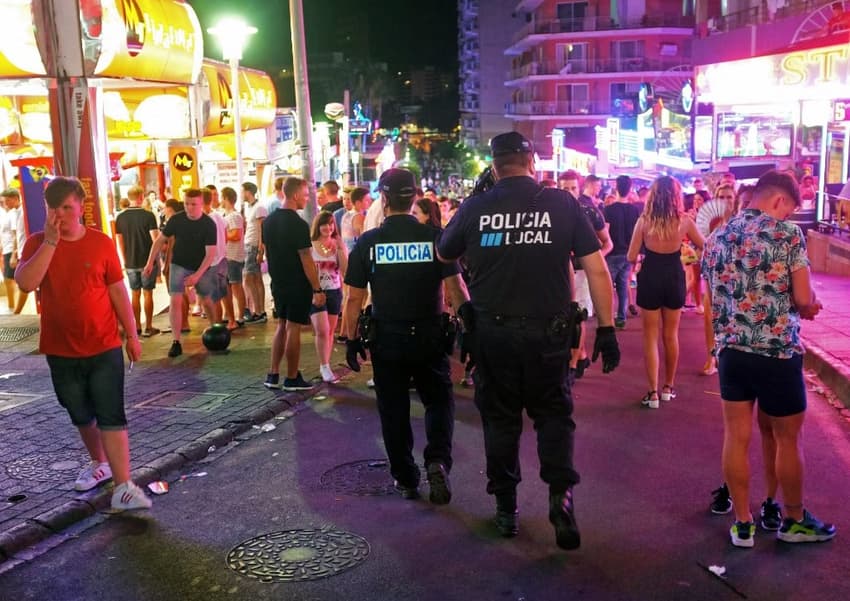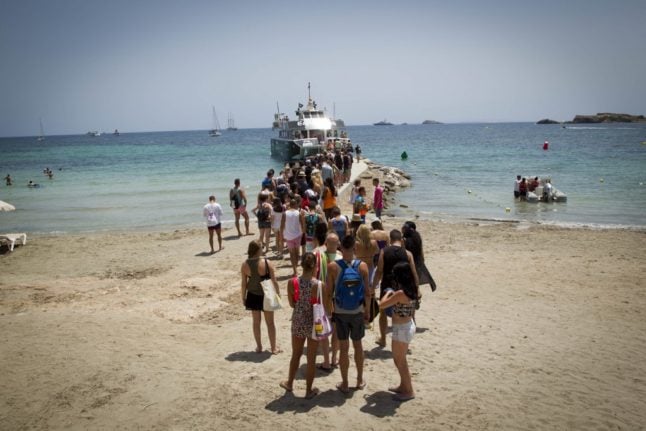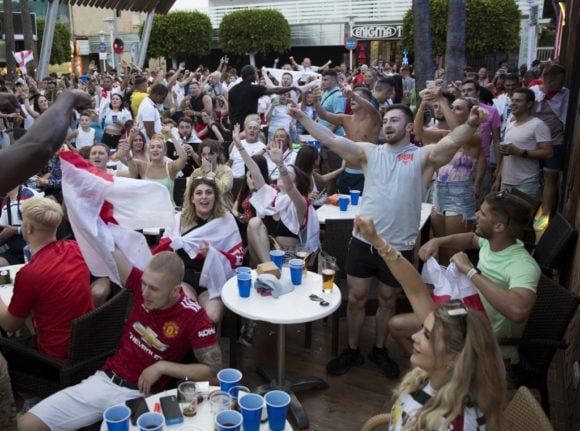EXPLAINED: The new alcohol rules for tourists in Spain's Balearic Islands

Mallorca and Ibiza are well known to many as booze tourism destinations but after new legislation was introduced in 2020, it's only now that the crackdown on excessive drinking by holidaymakers is being enforced.
The Balearic Islands, made up of Mallorca, Menorca, Ibiza, and Formentera, are well known not only for their beautiful coastal resorts but also their booze tourism spots.
Long famous for cheap drinks, pub crawls, and booze cruises, tourists from across Europe have descended on the islands for cheap drunken fun for decades.
Yet new rules cracking down on excessive drinking and disorderly behaviour on the islands are making that harder, with authorities attempting to change the Balearics' image and model of tourism.
The rule changes came into effect in January 2020 but owing to the total shutdown of international travel and tourism during the first two years of the Covid-19 pandemic, its impacts are only being felt now.
On the islands of Mallorca and Ibiza, the crackdowns are focused on the popular tourist areas of Magaluf, El Arenal and Sant Antoni that are synonymous with drunken revelry and boozy getaways.
The new rules
- Legislation means that 2-for-1, happy hour, and free bar offers are now banned. Advertising of these kinds of cheap boozy deals are also prohibited in the hotspots.
- The sale of alcohol in shops has been scaled back as they are now forced to close between 9:30 p.m. and 8:00 a.m.
- The rule changes ban the granting of new licenses for booze cruise style ‘party boats’ and the limiting of alcoholic beverages to six per day in all-inclusive hotels.
- The infamous tourist practice of ‘balconing’ - when drunken tourists launch themselves from balconies into swimming pools - has also been banned and will, according to the official government bulletin released in 2020, "expel with immediate effect" those partaking in the popular and often lethal activity.
- Restaurants and bars that serve food are also limited in how much alcohol they can serve, in addition to all-inclusive resorts. The new rules state the maximum per lunch or dinner is three alcoholic beverages.
READ MORE: Spanish islands crackdown on booze tourism model
- A favourite of many British tourists, pubcrawls, have also been banned, with fines handed out to establishments advertising their bars or restaurants as part of boozy routes through the islands. According to the official bulletin, “the advertising, organisation, sale and realisation of the so-called routes (pub crawling) is prohibited, where the objective is the tour of different venues in which drinks of alcoholic beverages are included continuously and on the same day.”
Establishments that don't follow the rules will face hefty fines, according to the legislation. The government texts outlines fines of between €1,000 and €600,000, plus the possibility of shutting down offending establishments for up to three years.

Tourists queue to take part in a boat party on Figueretes Beach in Ibiza. (Photo by JAIME REINA / AFP)
Feeling the effects
Many tourists arriving in the Mediterranean islands in 2022 are unaware of the new changes.
Easyjet is warning all its potential customers flying to Sant Antoni of the new crackdown, and the British press is also publishing stories of disgruntled tourists unhappy they can’t go on pubcrawls and are limited in how many drinks they can order in hotels and restaurants.
The Balearic government say it is the first legislation in Europe to ban the sale and advertising of alcohol in specific tourist areas. Yet because the island's economy - much like the Spanish economy more broadly, of which tourism makes up a sizeable 13% chunk of GDP - is so dependent on tourists, and welcomes over 13 million of them every year, it will have to strike a balance between the revenue that comes from booze tourism and realising its aims of 'sustainable tourism'.

English holidaymakers in Magaluf having drinks while watching Euro 2020. The holiday spot is popular among young European revellers, most of them British. (Photo by JAIME REINA / AFP)
READ MORE: 13 mistakes in Spain tourists are bound to make
It is unclear if other tourist hotspots in Spain, such as the Costa Blanca and Costa del Sol, will follow similar models and try to shift away from being the default destination for cheap, boozy getaways. The changes in the Balearics come amid broader debate in Spain about the role and model of tourism, and how it aligns with the Spanish economy as it heads into the first non-COVID summer season and tries to recover from the pandemic.
Freed from COVID-19 restrictions it may be, the Spanish tourism sector - or more specifically, the tourists coming to enjoy it - now face newer, self-imposed restrictions aimed at rebranding its imagine and moving away from its long-held booze tourism model.
Comments
See Also
The Balearic Islands, made up of Mallorca, Menorca, Ibiza, and Formentera, are well known not only for their beautiful coastal resorts but also their booze tourism spots.
Long famous for cheap drinks, pub crawls, and booze cruises, tourists from across Europe have descended on the islands for cheap drunken fun for decades.
Yet new rules cracking down on excessive drinking and disorderly behaviour on the islands are making that harder, with authorities attempting to change the Balearics' image and model of tourism.
The rule changes came into effect in January 2020 but owing to the total shutdown of international travel and tourism during the first two years of the Covid-19 pandemic, its impacts are only being felt now.
On the islands of Mallorca and Ibiza, the crackdowns are focused on the popular tourist areas of Magaluf, El Arenal and Sant Antoni that are synonymous with drunken revelry and boozy getaways.
The new rules
- Legislation means that 2-for-1, happy hour, and free bar offers are now banned. Advertising of these kinds of cheap boozy deals are also prohibited in the hotspots.
- The sale of alcohol in shops has been scaled back as they are now forced to close between 9:30 p.m. and 8:00 a.m.
- The rule changes ban the granting of new licenses for booze cruise style ‘party boats’ and the limiting of alcoholic beverages to six per day in all-inclusive hotels.
- The infamous tourist practice of ‘balconing’ - when drunken tourists launch themselves from balconies into swimming pools - has also been banned and will, according to the official government bulletin released in 2020, "expel with immediate effect" those partaking in the popular and often lethal activity.
- Restaurants and bars that serve food are also limited in how much alcohol they can serve, in addition to all-inclusive resorts. The new rules state the maximum per lunch or dinner is three alcoholic beverages.
READ MORE: Spanish islands crackdown on booze tourism model
- A favourite of many British tourists, pubcrawls, have also been banned, with fines handed out to establishments advertising their bars or restaurants as part of boozy routes through the islands. According to the official bulletin, “the advertising, organisation, sale and realisation of the so-called routes (pub crawling) is prohibited, where the objective is the tour of different venues in which drinks of alcoholic beverages are included continuously and on the same day.”
Establishments that don't follow the rules will face hefty fines, according to the legislation. The government texts outlines fines of between €1,000 and €600,000, plus the possibility of shutting down offending establishments for up to three years.

Feeling the effects
Many tourists arriving in the Mediterranean islands in 2022 are unaware of the new changes.
Easyjet is warning all its potential customers flying to Sant Antoni of the new crackdown, and the British press is also publishing stories of disgruntled tourists unhappy they can’t go on pubcrawls and are limited in how many drinks they can order in hotels and restaurants.
The Balearic government say it is the first legislation in Europe to ban the sale and advertising of alcohol in specific tourist areas. Yet because the island's economy - much like the Spanish economy more broadly, of which tourism makes up a sizeable 13% chunk of GDP - is so dependent on tourists, and welcomes over 13 million of them every year, it will have to strike a balance between the revenue that comes from booze tourism and realising its aims of 'sustainable tourism'.

READ MORE: 13 mistakes in Spain tourists are bound to make
It is unclear if other tourist hotspots in Spain, such as the Costa Blanca and Costa del Sol, will follow similar models and try to shift away from being the default destination for cheap, boozy getaways. The changes in the Balearics come amid broader debate in Spain about the role and model of tourism, and how it aligns with the Spanish economy as it heads into the first non-COVID summer season and tries to recover from the pandemic.
Freed from COVID-19 restrictions it may be, the Spanish tourism sector - or more specifically, the tourists coming to enjoy it - now face newer, self-imposed restrictions aimed at rebranding its imagine and moving away from its long-held booze tourism model.
Join the conversation in our comments section below. Share your own views and experience and if you have a question or suggestion for our journalists then email us at [email protected].
Please keep comments civil, constructive and on topic – and make sure to read our terms of use before getting involved.
Please log in here to leave a comment.